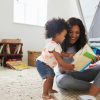Foundational literacy skills encompass a broad range of abilities related to listening, understanding, speaking, reading, and writing. These skills and abilities are essential for children’s overall development and academic success. Early literacy skills lay the groundwork for lifelong learning.
Families and caregivers play a crucial role in nurturing these skills beginning at birth. For very young infants, engaging in activities such as talking, singing, and making eye contact not only makes emotional connections but also stimulates brain development.
As infants grow, and they begin to coo and babble, pausing and listening before responding mimics natural conversation. This helps infants begin to internalize speech patterns and build relationships.
Providing older infants and toddlers with opportunities to hear stories and interact with books supports print awareness, enhances comprehension skills, and increases vocabulary development. While more fragile books may require adult supervision, fabric and board books are made to withstand the curious and enthusiastic hands of infants and toddlers.
Developing the muscles in the hands and fingers is also an essential literacy skill. Finger rhymes and songs (The Itsy-Bitsy Spider, for example), finger foods that encourage grasping and self-feeding, as well as handheld toys and activities, strengthen the skills children will need to turn the pages in books and hold writing tools. As children grow, they will benefit from activities like playdough, clay modeling, and finger painting.
Older toddlers and preschoolers will also enjoy reading books, making up stories, and engaging in pretend play, which encourages thinking and language development. Letter recognition and letter sound activities are also fun at this age. Alphabet books, matching letters, matching letter sounds, learning names, and identifying letters in the environment are some ways to help children understand that letters are the building blocks of written language.
Here are some of my favorite alphabet books:
- “Chicka Chicka Boom Boom” by Bill Martin Jr. & John Archambault
- “Eating the Alphabet” by Lois Ehlert
- “LMNO Peas” by Keith Baker
- “I Spy Little Letters” by Jean Marzollo & Walter Wick
- “Alphabet City” by Stephen T. Johnson
Dr. Tonya Satchell, Assistant Research Scientist and Program Director for Early Childhood Research and Evaluation, leads several statewide early childhood system-based projects aimed at improving access to quality child care for all children. She has dedicated over two decades to early childhood education, teaching young children and directing child care centers before joining the JHU School of Education in 2012.
Her research interests include increasing access to high-quality early childhood systems and interventions. Passionate about early literacy, inclusive practices, and the value of learning through play and exploration, she is committed to ensuring access to quality early learning for all children.

